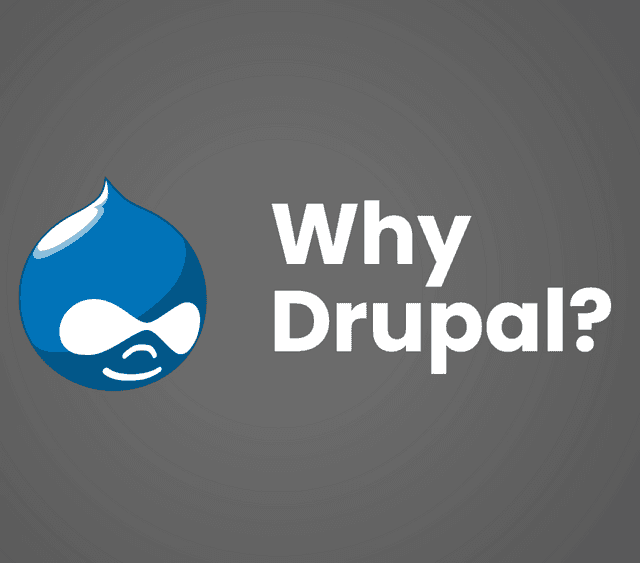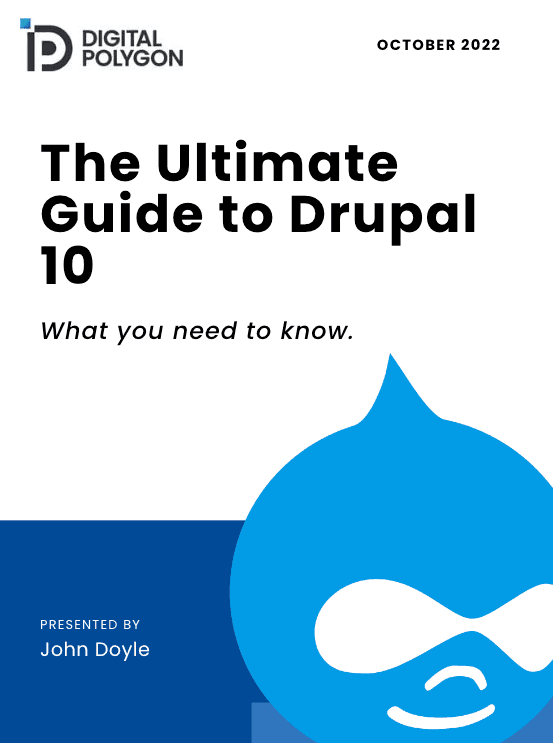Drupal is consistently named among the best content management systems, or CMS, that can power your website. If you've never looked into Drupal before, you may not be familiar with its perks. It doesn't matter whether you're an individual, small business, agency, or enterprise... you can create powerful websites and apps using Drupal! Let's explore why the many benefits of Drupal have resulted in a community that is both loyal and large.
1. It's Open-Source, Which Attracted A Large, Collaborative Community
You might initially be attracted to Drupal because it's open-source, which means that it's free to download, use, and modify to a certain degree. The real selling point here is that due to its open-source nature, Drupal has fostered a huge community of over 1M+ Drupal developers and users who can quickly respond to questions about installing, using, or customizing Drupal. If you have questions, chances are they've already been answered if it's common, so finding the answer can be as easy as a look-up on a discussion forum to make any fixes and get your site working just how you want it. Because Drupal uses PHP libraries rather than proprietary code, you only need to find someone familiar with PHP to answer your questions. The result is a spirit of collaboration that beats most other software, let alone CMS solutions.
2. It's An Enterprise CMS
There's no reason for enterprises to reinvent the wheel. Thanks to Drupal Enterprise CMS (ECM) Platform Distribution, you get access to the Drupal core you've come to rely on. However, you also have access to ready-made enterprise solutions and examples of the best enterprise examples to follow. International organizations will especially find the country and domain configurators that come with Enterprise CMS useful. Enterprise CMS includes a theme along with SEO, integration, content moderation, teaser, workbench, paragraph, and multisite configurators.
3. Developers Made It Future-Proof
While some CMS developers never seem to catch up with bugs, Drupal's developers consistently look toward the future and pay it forward. You can see examples of this with how developers have built RESTful web services and the JSON:API into Drupal, making it a full platform and not just a blog framework. Furthermore, core contributors to the community ensured that Drupal websites would be responsive, mobile-friendly, and easy to optimize for search engines to make sure they kept up with lightning-quick changes in marketing and internet usage.
4. Drupal is Flexible
Whether your website is a blog, wiki, eCommerce site, or something else entirely, you can do it with Drupal because the CMS was designed to be an economic starting point that can be enhanced for your specific needs. Even highly-customized Drupal websites can offer cost savings in the long term for organizations over WordPress installations because of its flexibility and ability to scale. Keep in mind that Drupal's core modules will set you up with a great foundational starting point, but there are over 36,000 community-created modules you can leverage. You can dive into the code to make your site work for your organization or implement modules to do the heavy lifting for you. Imagine the possibilities! Because no two organizations have the same needs, no two Drupal builds will be the same.
5. Drupal Handles Code the Right Way
Thanks to modern development tools, Drupal enforces quality code -- This means a higher quality site and more consistency for your website/platform. Drupal uses these tools to enforce quality standards throughout the application starting with the code and ending with the user-facing experience across devices. Site owners will notice that add-ons adhere to the best code practice, so visitors to your site will have a better user experience and faster loading time thanks to clean code. On top of this, automated code updates negate the need for intervention, ultimately reducing the potential for user error. There's a clear separation between code and content in Drupal that will enable you to manage your site more effectively.
6. Your Websites Will Be Attractive
Aside from the sheer number of modules you can implement on your Drupal website, you also have plenty of options when it comes to appearance. Designers have created thousands of quality themes specifically for Drupal websites. You can often choose fonts, adjust color schemes, add stock images, and adjust your website's appearance in the layout editor. Although you don't need to know any code to create a site with Drupal, you can create your own template from the ground up if you prefer.
7. Drupal Is Secure
While other content management systems are notoriously insecure, Drupal's open-source nature and large community ensure that the code is examined from every angle. This highlights security vulnerabilities that can be hardened or closed in real-time by Drupal's dedicated security team. Updates come quickly, so you never have to wait for the latest security patch or newest functions. And with so many community members to test every aspect of Drupal, everyone benefits from a more stable platform. There are even third-party modules to enhance the security of your Drupal website. You can add CAPTCHAs to protect your website from bots and spams and honeypots to deter hackers. Modules can force users to sign out after a specific period, and you can minimize the human risk by adding modules that require strong passwords that are frequently updated.
8. It Offers Scalability
Drupal is a CMS, but it's also so much more than that. With Drupal, you can share resources across a number of websites through the multisite function, which is ideal for organizations as well as Managed Service Providers or designers that maintain multiple resources for clients. Drupal's scalability is also supported by user-friendly automation tools that take the hard work out of the building or maintaining websites or apps with Drupal. Plus, those teams who deploy Drupal to multi-tiered environments will be pleased to learn that Drupal's configuration management system allows updates to be deployed between environments in a repeatable manner, ensuring consistency and quality and ultimately leading to lower cost of ownership than other platforms.
9. You Can Access Content Moderation and Architecture
With Drupal's content moderation, it's much easier to get your entire team involved in creating and editing content. Drupal supports different workflows, so depending on your requirements for a content workflow, your organization can find the perfect solution to content creation without risking premature publishing of content. Furthermore, Drupal allows you to display structured content in multiple view modes.
10. Drupal Boosts Website Performance
Thanks to a slew of features — image optimization, JavaScript minimization, caching, code enforcing, and content delivery networks, to name just a few, Drupal websites are fast and not clunky due to clean code. This is really important not just for search engine ranking, but since your visitors will also expect a speedy website. You'd be surprised how a website that's only a fraction of a second faster can result in higher conversions and a lower bounce rate. This is good news for you and bad news for your competition!
The easiest way to understand the flexibility, ease of use, and cost-savings of Drupal may just be to try it for yourself. If you're ready to try Drupal, talk to our team about your next project today!





